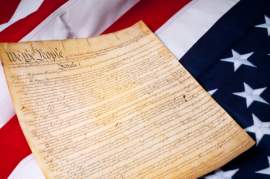
Gitlow v. New York

Gitlow v. New York: The Background
The case of Gitlow v. New York took place in 1925. The case of Gitlow v. New York dealt with a number of Constitutional amendments—these are the rights guaranteed to American citizens. The case of Gitlow v. New York also dealt with state governments and specifically their ability to uphold these civil liberties expressed in the United States Constitution.
The case of Gitlow v. New York deals with a man named Benjamin Gitlow. This man was considered to be a Socialist and a potential anarchist. The United States government viewed this man as a threat because he believed in a type of government that the United States did not practice. Benjamin Gitlow was charged with violating “Anti Anarchist” laws because he spread magazines and newspapers which degraded the United States government and preached anti-government views.
Benjamin Gitlow was a socialist. He did not believe in how the United States governed its people. To spread his views, Gitlow published a number of papers and magazines which ultimately talked bad about the United States government. The Federal Government did not like Gitlow’s efforts. The government was afraid that Gitlow’s words would spark an uprising against the government.
Following this initial conviction, Benjamin Gitlow appealed, stating that his charges were in direct violation of his 1st and 14th amendment rights—these rights are guaranteed in the United States Constitution. This appeal is regarded as the Gitlow v. New York case.
Gitlow v. New York: The Case Profile
In Gitlow v. New York, Benjamin Gitlow was convicted of violating legislation that outlawed anti-government speech that is spread to the general public in newspaper, magazine or other print. In response to these charges, Benjamin Gitlow appealed claiming the State of New York violated his constitutional rights. The case of Gitlow v. New York was heard in the United States Supreme Court. Gitlow v. New York was officially decided on June 8th of 1925.
Gitlow v. New York: The Verdict
The United States Supreme Court found that Benjamin Gitlow was guilty of his crimes; however, the court also found that the individual state governments were not allowed to deny their residents the civil and human rights expressed within the United States Constitution. The ruling of Gitlow v. New York basically said that the New York state government abused their powers, but Benjamin Gitlow was in fact guilty of his accused crimes.
The 1st Amendment of the United States constitution ensures that all citizens of the country are awarded the right to free speech. This right also includes the freedom to express oneself so long as the individual’s actions are legal. Benjamin Gitlow, because he spread anti-government and hateful speech was not protected under the 1st amendment of the United States Constitution. If you need legal advice and assistance, contact New York lawyers.



















